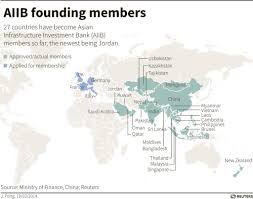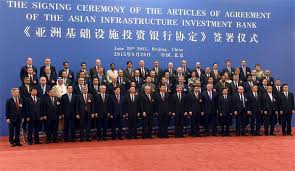Relations between Asean and China are already strong, but expect them to draw even closer as they mark the 25th anniversary of dialogue relations.
THERE is a narrative in China that illustrates the interdependence of trade between Asean countries and China.
The little story, told in a programme produced by the state television broadcaster, goes like this: 36g of palm oil from Indonesia are needed to deep-fry three packets of instant noodles that would be consumed by Chinese customers.
The bio waste generated from producing the palm oil, meanwhile, can power 200 five-watt energy-saving light bulbs in Singapore for an hour.
To China, Asean is its “close neighbour connected by mountains and waters”. Collectively, the 10 nations in Asean are China’s third largest trading partner, while China is Asean’s largest trading partner.
In 2014, the two-way trade reached US$480bil (RM2 trillion) and investment was valued at US$130bil (RM558bil), with both sides aspiring to elevate the figures to US$1 trillion (RM4.3 trillion) and US$150bil (RM644bil) respectively by 2020.
To help realise this goal, China and Asean sealed a deal during the Asean summit in Kuala Lumpur to upgrade their Free Trade Area in November.
The geographical proximity makes Asean countries the first participants of China’s 21st century Maritime Silk Road (MSR), an initiative to foster connectivity and collaboration with countries along the route.
One of the flagship aspects of Belt and Road is railway connectivity. Last year, China embarked on rail projects with three Asean countries as part of Beijing’s ambition to connect China and Asean in order to facilitate the movements of goods and people.
In October, China won the bidding for the first high-speed rail (HSR) project in South-East Asia – the Jakarta-Bandung HSR in Indonesia.
A ground-breaking ceremony for the joint Lao-Chinese railway was held in December, followed by another ceremony to launch the Thai-Chinese railway project for two medium-speed lines.
Cooperation between ports is another key area of the MSR.
Malaysia, which is China’s largest trading partner in Asean, forged a port alliance with China during Chinese Premier Li Keqiang’s official visit to Malaysia in November.
China-Asean Business Council executive president Xu Ningning said Port Klang, which is the world’s 13th busiest port, can become an important locale for Chinese to “go out”, referring to China’s policy that encourages its enterprises to invest overseas.
“Malaysian investment in China is still higher than Chinese investment in Malaysia at the moment. I’d suggest Malaysia step up its promotional activities on investment opportunities to attract Chinese enterprises to Malaysia,” he commented on the sidelines of a China-Asean forum on the MSR in Beijing recently.
Former minister counsellor (economic affairs) in the Malaysian Embassy in China Datuk Ong Chong Yi pointed out that the two-way trade between Malaysia and China, which has reached US$ 102bil in 2014, accounted for one-fifth of the China-Asean trade.
Ong, who had just assumed the role as the CEO of China-Malaysia Qinzhou Industrial Park (Guangxi) Development Co Ltd, said once the Trans-Pacific Partnership deal and other multilateral or bilateral trade agreements are put in place, Malaysia would be an ideal destination to help China to enter other markets.
To provide capital support and drive infrastructure projects, China has set up the US$40bil (RM171.6bil) Silk Road Fund and a US$10bil (RM42.9bil) China-Asean Investment Cooperation Fund (CAF).
CAF CEO Li Wen said the fund, which focuses on investment opportunities in infrastructure, energy and natural resources in Asean, has invested in 10 projects in eight countries since its establishment five years ago.
Silk Road Fund Co Ltd managing director Luo Yang said the fund is interested in collaborating with Asean countries under the framework of connectivity.
A discussion of China-Asean relations will surely involve the South China Sea territorial row, which sees China and four Asean neighbours – Malaysia, Brunei, Vietnam and the Philippines – laying overlapping claims on the busy passageway.
While China has carried out extensive construction on the Spratly Islands (which it calls Nansha), it said it preferred direct consultation with other claimants to tackle the problem, and rejected the Philippines’ move to file claims with the International Tribunal for the Law of the Sea over the dispute.
“The dispute is only temporary. As long as China and countries along the MSR have enough goodwill, political wisdom and sincerity, it will be solved through friendly negotiation,” Bai Tian, the deputy director of Chinese Foreign Ministry’s Asian Affairs Department, said.
He added: “South China Sea will be a sea of peaceful cooperation and prosperity.”
It is important to note that despite the territorial disagreement, all parties are still engaging each other actively in economic cooperation. For example, Malaysia, Vietnam, Brunei and the Philippines have all joined the China-led Asian Infrastructure Investment Bank (AIIB) as founding members.
This year, China and Asean will mark the 25th anniversary of the establishment of dialogue relations.
 A series of commemorative activities, including a summit, is expected to be held to mark the milestone and draw the region and China closer to each other.
A series of commemorative activities, including a summit, is expected to be held to mark the milestone and draw the region and China closer to each other.
By Tho Xin Yi Check-in China
THERE is a narrative in China that illustrates the interdependence of trade between Asean countries and China.
The little story, told in a programme produced by the state television broadcaster, goes like this: 36g of palm oil from Indonesia are needed to deep-fry three packets of instant noodles that would be consumed by Chinese customers.
The bio waste generated from producing the palm oil, meanwhile, can power 200 five-watt energy-saving light bulbs in Singapore for an hour.
To China, Asean is its “close neighbour connected by mountains and waters”. Collectively, the 10 nations in Asean are China’s third largest trading partner, while China is Asean’s largest trading partner.
In 2014, the two-way trade reached US$480bil (RM2 trillion) and investment was valued at US$130bil (RM558bil), with both sides aspiring to elevate the figures to US$1 trillion (RM4.3 trillion) and US$150bil (RM644bil) respectively by 2020.
To help realise this goal, China and Asean sealed a deal during the Asean summit in Kuala Lumpur to upgrade their Free Trade Area in November.
The geographical proximity makes Asean countries the first participants of China’s 21st century Maritime Silk Road (MSR), an initiative to foster connectivity and collaboration with countries along the route.
One of the flagship aspects of Belt and Road is railway connectivity. Last year, China embarked on rail projects with three Asean countries as part of Beijing’s ambition to connect China and Asean in order to facilitate the movements of goods and people.
In October, China won the bidding for the first high-speed rail (HSR) project in South-East Asia – the Jakarta-Bandung HSR in Indonesia.
A ground-breaking ceremony for the joint Lao-Chinese railway was held in December, followed by another ceremony to launch the Thai-Chinese railway project for two medium-speed lines.
Cooperation between ports is another key area of the MSR.
Malaysia, which is China’s largest trading partner in Asean, forged a port alliance with China during Chinese Premier Li Keqiang’s official visit to Malaysia in November.
China-Asean Business Council executive president Xu Ningning said Port Klang, which is the world’s 13th busiest port, can become an important locale for Chinese to “go out”, referring to China’s policy that encourages its enterprises to invest overseas.
“Malaysian investment in China is still higher than Chinese investment in Malaysia at the moment. I’d suggest Malaysia step up its promotional activities on investment opportunities to attract Chinese enterprises to Malaysia,” he commented on the sidelines of a China-Asean forum on the MSR in Beijing recently.
Former minister counsellor (economic affairs) in the Malaysian Embassy in China Datuk Ong Chong Yi pointed out that the two-way trade between Malaysia and China, which has reached US$ 102bil in 2014, accounted for one-fifth of the China-Asean trade.
Ong, who had just assumed the role as the CEO of China-Malaysia Qinzhou Industrial Park (Guangxi) Development Co Ltd, said once the Trans-Pacific Partnership deal and other multilateral or bilateral trade agreements are put in place, Malaysia would be an ideal destination to help China to enter other markets.
To provide capital support and drive infrastructure projects, China has set up the US$40bil (RM171.6bil) Silk Road Fund and a US$10bil (RM42.9bil) China-Asean Investment Cooperation Fund (CAF).
CAF CEO Li Wen said the fund, which focuses on investment opportunities in infrastructure, energy and natural resources in Asean, has invested in 10 projects in eight countries since its establishment five years ago.
Silk Road Fund Co Ltd managing director Luo Yang said the fund is interested in collaborating with Asean countries under the framework of connectivity.
A discussion of China-Asean relations will surely involve the South China Sea territorial row, which sees China and four Asean neighbours – Malaysia, Brunei, Vietnam and the Philippines – laying overlapping claims on the busy passageway.
While China has carried out extensive construction on the Spratly Islands (which it calls Nansha), it said it preferred direct consultation with other claimants to tackle the problem, and rejected the Philippines’ move to file claims with the International Tribunal for the Law of the Sea over the dispute.
“The dispute is only temporary. As long as China and countries along the MSR have enough goodwill, political wisdom and sincerity, it will be solved through friendly negotiation,” Bai Tian, the deputy director of Chinese Foreign Ministry’s Asian Affairs Department, said.
He added: “South China Sea will be a sea of peaceful cooperation and prosperity.”
It is important to note that despite the territorial disagreement, all parties are still engaging each other actively in economic cooperation. For example, Malaysia, Vietnam, Brunei and the Philippines have all joined the China-led Asian Infrastructure Investment Bank (AIIB) as founding members.
The Beijing-based multilateral lender aims to help Asia build roads, power grids and other essential infrastructure. It will hold the first meetings of its board and executive council on Jan. 16-18, 2016. The AIIB counts 57 founding members.
This year, China and Asean will mark the 25th anniversary of the establishment of dialogue relations.
 A series of commemorative activities, including a summit, is expected to be held to mark the milestone and draw the region and China closer to each other.
A series of commemorative activities, including a summit, is expected to be held to mark the milestone and draw the region and China closer to each other.By Tho Xin Yi Check-in China
Hard work the key to realising 2016 goals President Xi Jinping
looked forward to 2016 in a speech calling for confidence and hard work
f...


 Apr 11, 2015 ... Many see the rush to join the Asian Infrastructure Investment Bank as the
beginning of a new international financial order and the decline of US ...
Apr 11, 2015 ... Many see the rush to join the Asian Infrastructure Investment Bank as the
beginning of a new international financial order and the decline of US ...
Trade volume between China and the US hit $441.6 billion in the first
three quarters of the year, surpassing the $438.1 billion in trade be...
Oct 27, 2014 ... Chinese President Xi Jinping's (C-R) meeting with the members of the Asian
Infrastructure Investment Bank (AIIB) in the Great Hall of the...
|
Apr 5, 2015 ... Every single U.S. ally with the exception of Japan have all hopped on board the
Asian Infrastructure Investment Bank, or AIIB. Italy and France ...
|
Jun 30, 2015 ... Financial leaders of 57 states gathered in Beijing on June 29 to sign the
agreement for establishing the Asian Infrastructure Investment Bank ...
|
Sunday, November 29, 2015 ... To recap, at the Malaysia-China High-Level
Economic Forum on Nov 23 in Kuala Lumpur, Li said: “It is imperative to stabilise
the ... Malaysian top businessmen meeting with Premier Li on Nov 23 of 2015.
|









